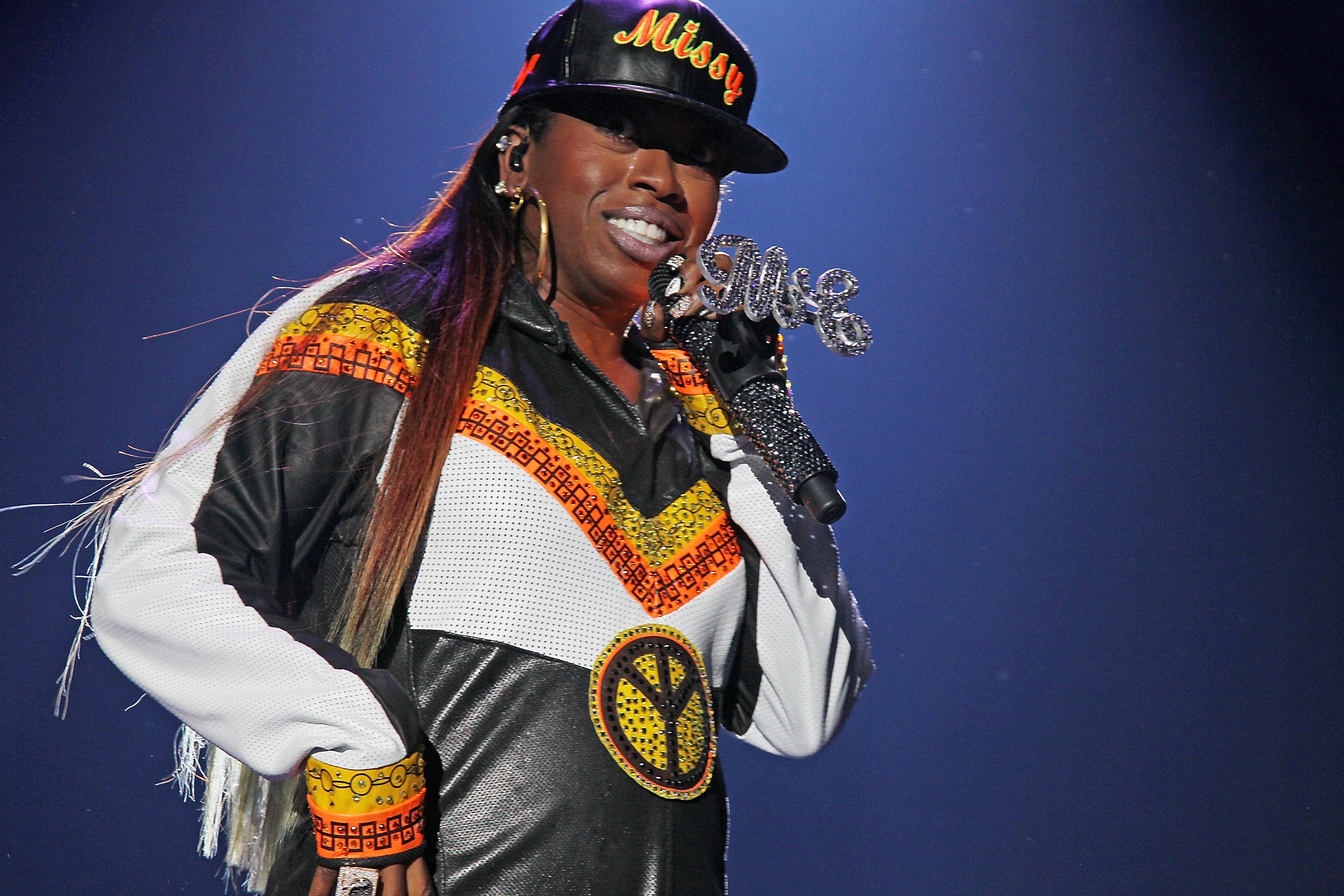
Let’s start here: No woman in hip-hop has sold more records in the history of the Nielsen ratings. Not Queen Latifah. Not Lauryn Hill. Not Lil Kim or Foxy. Not Nicki Minaj. No one. There’s this woman. And then there’s everyone else.
We can also start here: She singlehandedly changed the very identity of what a performer could look and sound like—owning her style unapologetically. If you don’t understand how finger waves and garbage bags could change a generation of—
Wait. We’re getting ahead of ourselves. Let’s talk about being legendary.
WATCH: Celebrating Missy’s 20th Anniversary
Legends are both born and made. And Melissa “Missy” Elliot cemented her status as a future legend while she was still a teenager.
She grew up writing music and forming groups. In 1991, she got a chance at the big time—singing for Devante from Jodeci, the New Jack Swing group who ran the charts at the time. Before her ad hoc audition, she checked in with Timothy Mosley, her friend and future musical partner who would later be named Timbaland.
Tim was unsure about what singing for DeVante would do. Jodeci was huge. Missy and her band mates were local and unpolished.
“So you really think you’re going to get a chance to sing for him?” Tim asked Missy.
“I will absolutely sing for him,” Missy said.
“And you really think he’s going to be feeling y’all?”
“He will absolutely be feeling us.”
“And you honestly think he’s going to sign you to a record deal? While he’s still here in town?”
“He is going to sign us to a record deal while he’s here in town.”
We all know where this is going, right? Timbaland thought poor Missy was really misguided to put so much faith in a singing group that had not been able to get off the ground. The idea that they could leap into the same universe as Jodeci was laughable. But we all know what happens when you underestimate Missy Elliot.
The next day, she found a way to sing for Jodeci. DeVante was feeling the group. And he signed them to his newly formed record label within days.
RELATED: How Missy Elliott’s Backward Vocals In ‘Work It’ Came Together
But the experience with Devante turned into a disaster and their album was never released. Elliot immediately decided that she would never perform again. She’d found her groove with Timbaland and planned to only write and produce for other artists—performing and recording was too unpredictable and painful.
For the next five years, it made perfect sense for Missy to stick to writing and producing. SWV. 702. Mary J. Blige. New Edition. Destiny’s Child. Missy wrote and produced monster hits for a bevy of artists, stomping tracks with her signature eclectic style.
It would be her work with Aaliyah that would cement her legacy—as well as Timbaland, her musical partner in crime. The duo worked on nearly every track from One In A Million, Aaliyah’s second album scoring hit after and moving it to double platinum status.
Missy decided to get a label deal so that she could sign and produce for her own artists. She met with Elektra’s Sylvia Rhone. Rhone told Missy she would be happy to give her a label deal—as long as the first release would be a solo Missy album.
Missy balked. She told Rhone about the group she was in. She told her about how she felt like she didn’t have the right look. And that her sound would be too far left for the audience.
Rhone told her to get in the studio for a few days and see what happened. Two weeks later, Supa Dupa Fly, which turns 20 years old this month, was completed.
RELATED: Subscribe to our daily newsletter for the latest in hair, beauty, style and celebrity news.
Why this album matters. First, the singles from the album, including “The Rain” and “Sock It 2 Me” are timeless hits that would undoubtedly win Grammys today. Also, Missy predates some of our favorite hip-hop artists—giving them a vibe that would remain fresh for decades. Singing and rapping and producing like Lauryn Hill? Missy did it a year earlier. Switching up faux accents and funky facial expressions like Nicki Minaj? Missy did it when Nicki was a teenager.
It’s not easy to show the world who you are—and be ready for the criticism that often comes with it. Missy never wavered.
It may seem odd to boil down Missy’s effervescence to one song, one video, one moment. But the true testament to who she is was born in that way. In the video for “The Rain,” music video director Hype Williams used a fish-eye lens on Missy, who’s rocking industrially glossy finger waves, dark lipstick and inexplicably—an outfit that looked like an inflated garbage bag.
This just wasn’t what women did in hip-hop back then. Outside perhaps the antics of TLC, which was more pop than hip-hop, there was little freedom. Women in hip-hop were either eye candy or too-cool-for-school. Missy refused to follow the rules. She wanted to create art—in the studio and in front of the camera. And by doing so she gave many women—and men—the idea that they didn’t need to be boxed in.
We began this journey explaining how finger waves and garbage bags could change the world.
Twenty years ago, Missy Elliot took those two inordinate items and changed the music world. And she never looked back.
Aliya S. King is the author of two novels and three non-fiction books, including the New York Times best-seller, Keep the Faith, written with Faith Evans.







